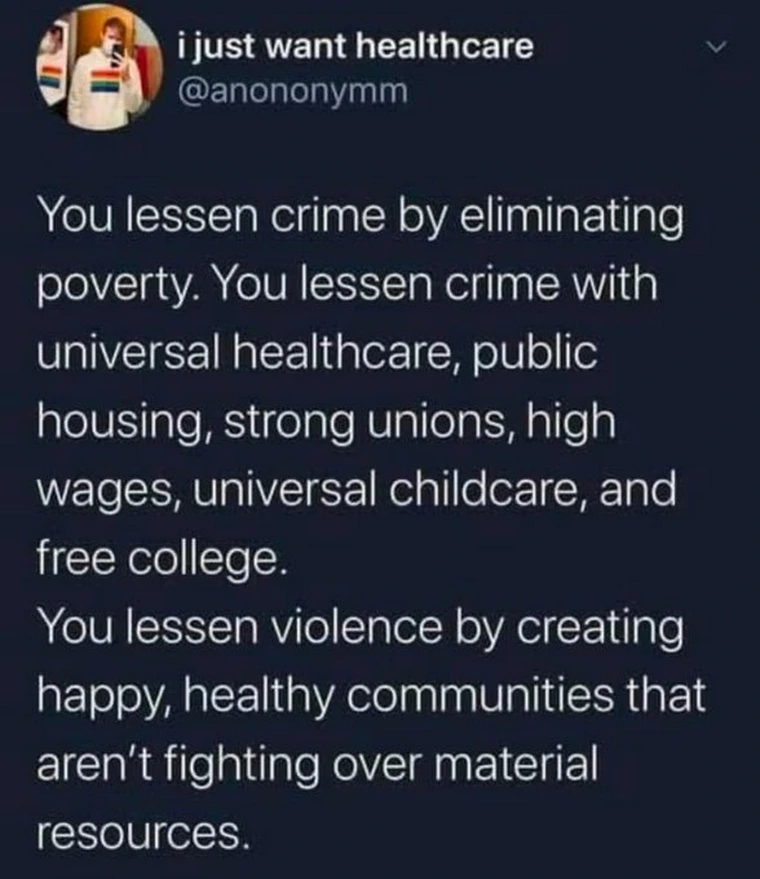this post was submitted on 04 Feb 2025
1507 points (99.0% liked)
Microblog Memes
6375 readers
2965 users here now
A place to share screenshots of Microblog posts, whether from Mastodon, tumblr, ~~Twitter~~ X, KBin, Threads or elsewhere.
Created as an evolution of White People Twitter and other tweet-capture subreddits.
Rules:
- Please put at least one word relevant to the post in the post title.
- Be nice.
- No advertising, brand promotion or guerilla marketing.
- Posters are encouraged to link to the toot or tweet etc in the description of posts.
Related communities:
founded 2 years ago
MODERATORS
you are viewing a single comment's thread
view the rest of the comments
view the rest of the comments

I can’t find the podcast. Maybe someone else can post an article about this:
Several years ago, I listened to a podcast that interviewed a man in Chicago who was conducting a study. His team found people with a criminal history(I think maybe drug dealers?) and tell them they’ll get $1000 a month. No strings attached.
There were a few who didn’t use the money well, but most quit crime/dealing drugs entirely. They found steady work and some went back to school.
All they needed was an opportunity to feel financially safe, feed their kids, and pay rent.
Edit: I think I found it? Here’s an article on it. Some of my facts were wrong, but the idea was right overall.
Chicago Future Fund
The article also mentions another called the Stock Economic Empowerment Demonstration.
I’m not sure which I heard about but I suspect the interview was with Richard Wallace who is mentioned in the article. Some of his talking points sounded familiar.
They've been trying it across the world, it's called Universal Basic Income. It's been proven mostly successful every time.
Here's an old article about the US: https://mashable.com/article/cities-with-universal-basic-income-guaranteed-income-programs
It's not "universal" unless/until it's given to everyone. Until then, it's just another targeted welfare program, "offered to a select portion of a city's population instead of all residents", as your link says.
You can't say UBI has been "proven mostly successful" without actually doing UBI, considering its main hurdles are related directly to giving out that much money to everyone. A UBI of $12000/year ($1000/month) for just all working-age people in the US (a bit over 200 million) would cost the government $2.4 TRILLION, yearly.
Even seizing the entirety of every US billionaire's net worth (est. $4.5 trillion), assuming you could convert it straight across into cash 1:1 (which you can't), and cutting defense spending (~$850 billion), the two most common ways I've seen people claim we can pay for UBI in the US, even if defense was cut to literal zero (also absurdly unrealistic), that still wouldn't even cover the cost of this UBI for three years.
The politics are easy, except that it needs a political champion who promises and delivers the redistribution of power that is UBI.
Technically UBI saves government money. That $2.4T is just transfers from net tax payers to net receivers. But because programs can be cut at that UBI level, It costs somewhere around $1200B (all government levels) less to provide $2.4T. Once you look at military budget as something that could increase your own cash, even more.
A fair tax system that eliminates payroll taxes and pays for universal healthcare can be 33%. Or 25% for first $100k income, and surtaxes at higher income levels.
https://www.naturalfinance.net/2019/06/andrew-yang-and-democrat-tax-proposals.html